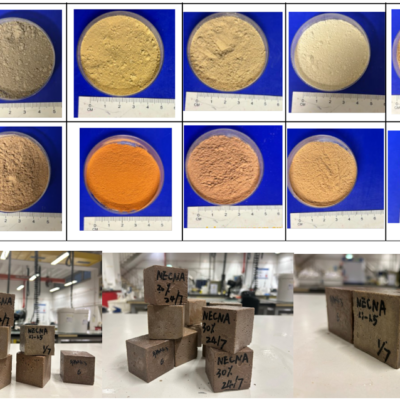
#84 Feasibility study of recycling excavated clay materials in full-scale concrete applications
Objectives
The study aims to explore the potential reuse of excavated clay-based materials for concrete applications as both cement and aggregate replacements. This project addresses two concurrent challenges: the disposal of excavated soil, often unused and sent to landfills, and the high carbon footprint associated with concrete applications.
Overview
In Australia, traditional low-carbon cement substitutes, such as fly ash (a coal industry by-product) and blast furnace slag (a steel industry by-product), face constraints due to ongoing changes. Cleaner energy production, leading to the closure of coal-fired power stations in the next decade, and modifications in steel manufacturing processes contribute to shortages of fly ash and blast furnace slag respectively. With a forecasted 70% growth in concrete demand, Australia must establish alternative cementitious materials that are eco-friendly, locally sourced and abundant to avoid dependence on imported cement alternatives.
Project description
Through sampling and characterising by-product clays sourced from two major Victorian construction projects – the M80 Ring Road Completion and the North East Link project – the trial aims to showcase the feasibility of incorporating heated spoil into concrete constituents. The study will progress to full-scale trials, paving the way for innovative and environmentally friendly concrete solutions. This study will demonstrate and confirm the use of calcined clay derived from clay/spoil excavated from project sites as a viable Supplementary Cementitious Material (SCM) and aggregate in concrete production. This will redefine the criteria for calcined clay in concrete, pushing the boundaries of sustainable construction practices.
Due to commercial calcinators not being available in the market, the study is proposing to use a heat treatment process normally used to treat contaminated soil to develop calcined clay and validate the feasibility of using alternative heat treatment facilities for the calcination of clay.
The project unfolds in 5 distinct stages:
- Phase 1 – A preselection process involves analysing soil through borehole assessments across the M80 Ring Road Completion project site and the North East Link project site. Characteristic soil is preselected based on predefined criteria from literature and site capacity. A full characterisation of these samples narrows down the highly promising soil samples.
- Phase 2 – This phase is conducted at a mortar scale and involves testing the preselected samples from Phase 1 in 3 different cement and mortar systems. Performance and long-term behaviour are thoroughly analysed.
- Phase 3 – The 2 most promising clay samples will be calcined/heated in larger quantities, transitioning from mortar-scale experiments to concrete-scale assessments in Phase 4.
- Phase 4 – This phase involves the concrete mix design development and testing, evaluating both mechanical and durability performance.
- Phase 5 – The most successful laboratory concrete mix is subjected to a full-scale trial, encompassing both in-situ and precast scenarios. This trial is conducted with the support of a concrete mixing plant and precast facility.
Project team: Dr Echo Wang, Laura Jukes, Sasika Perera, Miles Dacre, Ross Brookshaw, Lexie Walter, Julia Rogerson, Lucy Whalen, Rachel Lee, Adrian Pagnoccolo, Dr Madhuwanthi Rupashinghe, Hesong Jin, Prof. Tuan Ngo
Project parties: M80 Ring Road Completion, Spark – North East Link, Acciona

